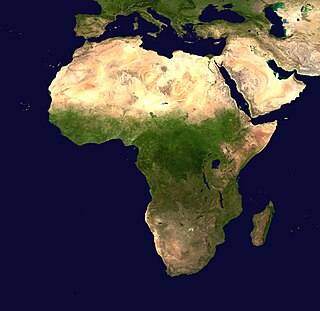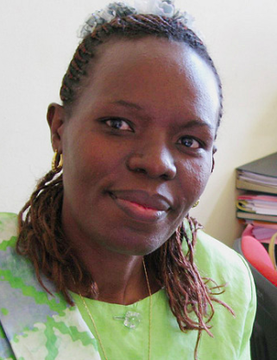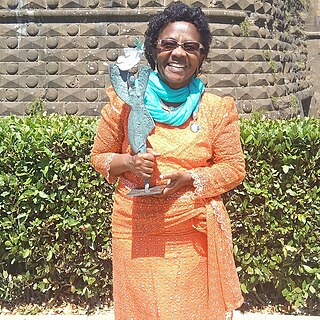Pro-Femmes Twese Hamwe is a national women's organization in Rwanda founded in 1992 [1] that is recognized internationally for its contributions to rebuilding society after the 1994 genocide against the Tutsi in Rwanda. These women took on the role of reconstructing what had been damaged. In order to restore Rwanda the women created projects to improve the economy, establish peace, and offer new opportunities. [2] The 13 women that started this organization were determined to speak out for injustices, especially against women, so they became a voice for change. The genocide incident caused great destruction; however, since 1994 the organization has grown to include 58 member associations. [3] These women work hard to make the changes and help the minorities grow and develop.
The purpose of the organization is not only about the Rwanda genocide, even though that is when it had its greatest impact, it was created to enhance women activity and provide recognition in favor of women. Due to all of the discrimination women were facing back in the early 1990s, this was an effective way to put up fight. [4] Because of this organization "Rwanda is amongst the best countries in the world in terms of women representation." [5] Working with women was not enough to help society as whole, therefore, they ensured all human rights were being met so that there was no social injustice. Their achievements include "peacekeeping, conflict management, mediation and reconciliation that empower women in leadership roles." [6] As well as helping soldiers, prisoners, and any discrimination within the people. Pro-Femmes received the 1996 UNESCO-Madanjeet Singh Prize for the promotion of tolerance and non-violence "for their outstanding contributions in rehabilitating families and communities devastated by mass violence, through their activities fostering a climate of peace based on tolerance and non-violence." [7] They received the inaugural Gruber Prize for Women’s Rights in 2003. [8] [9]
{{cite journal}}: Cite journal requires |journal= (help){{cite journal}}: Cite journal requires |journal= (help)
The Interahamwe is a Hutu paramilitary organization active in the Democratic Republic of the Congo and Uganda. The Interahamwe was formed around 1990 as the youth wing of the National Republican Movement for Democracy and Development, the then-ruling party of Rwanda, and enjoyed the backing of the Hutu Power government. The Interahamwe, led by Robert Kajuga, were the main perpetrators of the Rwandan genocide, during which an estimated 500,000 to 1,000,000 Tutsi, Twa, and moderate Hutus were killed from April to July 1994, and the term "Interahamwe" was widened to mean any civilian militias or bands killing Tutsi.
The United Nations General Assembly proclaimed 1995 the United Nations Year for Tolerance with UNESCO as the lead organization.

The International Day for Tolerance is an annual observance day declared by UNESCO in 1995 to generate public awareness of the dangers of intolerance. It is observed on 16 November.
François Houtart was a Belgian marxist sociologist and Catholic priest.
Veerasingham Anandasangaree is a Sri Lankan Tamil politician, former Member of Parliament and leader of the Tamil United Liberation Front. He is commonly known as Sangaree. A vocal critic of violence committed by all sides, Sangaree is a supporter of federalism similar to that of India as a solution to Sri Lanka's ethnic conflict.
The Gruber Prize for Women's Rights, established in 2003, was one of five international prizes worth US$500,000 awarded by The Peter and Patricia Gruber Foundation, an American non-profit organization.
The UNESCO-Madanjeet Singh Prize for the Promotion of Tolerance and Non-Violence is a prize awarded every two years by UNESCO. It was inaugurated in 1996, following the 1995 United Nations Year for Tolerance and in connection with the 125th anniversary of the birth of Mohandas Gandhi, funded by a donation from Madanjeet Singh.

African feminism includes theories and movements which specifically address the experiences and needs of continental African women. From a western perspective, these theories and movements fall under the umbrella label of Feminism, but this categorization is misleading for many branches of African "feminism". African women have been engaged in gender struggle since long before the existence of the western-inspired label "African feminism," and this history is often neglected. Despite this caveat, this page will use the term feminism with regard to African theories and movements in order to fit into a relevant network of Wikipedia pages on global feminism. Because Africa is not a monolith, no single feminist theory or movement reflects the entire range of experiences African women have. African feminist theories are sometimes aligned, in dialogue, or in conflict with Black Feminism or African womanism. This page covers general principles of African feminism, several distinct theories, and a few examples of feminist movements and theories in various African countries.

Karuna Center for Peacebuilding (KCP) is a 501(c)(3) non-profit organization based in Amherst, Massachusetts. The stated mission of KCP is to empower people divided by conflict to develop mutual understanding and to create sustainable peace. The organization was named for the Sanskrit word for compassion. The organization's efforts in facilitating "post-conflict reconciliation" have led to active programs in more than 30 countries. KCP has co-implemented programs with the United States Agency for International Development, United States Department of State, United States Institute of Peace, and Fund for Peace, among others.

Godeliève Mukasarasi is a Rwandan social worker, genocide survivor, and rural development activist. She created the organization Sevota to support widowed women and their children after the genocide. In 2018 she was given an International Women of Courage award for her work.
Anarkali Kaur Honaryar is a Sikh Afghan politician. She is also a women's rights activist and a dentist, as well as a medical doctor.
During the Rwandan genocide of 1994, over the course of 100 days, up to half a million women and children were raped, sexually mutilated, or murdered. The International Criminal Tribunal for Rwanda (ICTR) handed down the first conviction for the use of rape as a weapon of war during the civil conflict, and, because the intent of the mass violence against Rwandan women and children was to destroy, in whole or in part, a particular ethnic group, it was the first time that mass rape during wartime was found to be an act of genocidal rape.

The assessment of risk factors for genocide is an upstream mechanism for genocide prevention. The goal is to apply an assessment of risk factors to improve the predictive capability of the international community before the killing begins, and prevent it. There may be many warning signs that a country may be leaning in the direction of a future genocide. If signs are presented, the international community takes notes of them and watches over the countries that have a higher risk. Many different scholars, and international groups, have come up with different factors that they think should be considered while examining whether a nation is at risk or not. One predominant scholar in the field James Waller came up with his own four categories of risk factors: governance, conflict history, economic conditions, and social fragmentation.
As of 2018, the African country Rwanda ranks in the top five countries for gender equality according to the Global Gender Gap Report. The idea of fairness that dominates this country arose after the genocide against the Tutsi that occurred in 1994. The government is committed to ensuring equal rights for women and men without prejudice to the principles of gender equality and complementarity in national development. These ideas are exhibited through the roles of Rwanda women in government, the respect for women's education and the role of women in Rwanda healthcare. The country also took an active stance against rape in genocide, created a national action plan after United Nations Resolution 1325, and is pushing towards ending gender-based violence.

In 2001, as part of International Alert's Women Building Peace campaign, the United Nations Development Fund for Women awarded a Millennium Peace Prize for Women. The bronze prize was commissioned from American figurative sculptor Tim Holmes, who has created several such international awards. The sculpture, entitled Anima Mundi, depicts a woman whose facial features combine elements of many races, reaching and striding forward, hand on heart.
Genocide education refers to education about patterns and trends in the phenomenon of genocide and/or about the causes, nature and impact of particular instances of genocide.

Judith Kanakuze was a Rwandan politician and women's rights activist best known for passing legislation against gender-based violence, including Rwanda's first legal definition of rape, and contributing constitutional gender quotas that required women's representation in governmental bodies. She worked in multiple fields, including nutrition and civil service, before becoming a prominent leader of women after the 1994 Rwandan genocide, in which she lost most of her extended family. Kanakuze founded the early women's organization Réseau des Femmes and represented women's interests at the Arusha Accords and on Rwanda's committee to establish a constitution. The gender quotas that required women to compose at least 30 percent of governmental bodies subsequently quickly spurred women's participation to exceed the quotas in parliament. She was elected to Parliament in 2003 and reelected in 2008. During her terms, she presided over the Rwanda Women Parliamentary Forum.

Katana Gégé Bukuru is a Congolese activist fighting for women rights. She is also the founder of the SOFAD.

The 2018 Nobel Peace Prize was awarded to Denis Mukwege and Nadia Murad "for their efforts to end the use of sexual violence as a weapon of war and armed conflict," according to the Norwegian Nobel Committee announcement on 5 October 2018 in Oslo, Norway. "Both laureates have made a crucial contribution to focusing attention on, and combating, such war crimes," according to the award citation. After reading the citation, Committee Chair Berit Reiss-Andersen told reporters that the impact of this year's award is to highlight sexual abuse with the goal that every level of governance take responsibility to end such crimes and impunities.
Christian Davenport is the Mary Ann and Charles R. Walgreen Professor for the Study of Human Understanding and political scientist at the University of Michigan. affiliated with the Ford School of Public Policy as well as the University of Michigan Law School. He is also a Research Professor at the Peace Research Institute Oslo and an Elected Fellow of the American Academy of Arts and Sciences. Prior to joining the University of Michigan, Davenport was employed at the University of Notre Dame in political science and sociology as well as the Kroc Institute, the University of Maryland in political science, University of Colorado Boulder in political science and the University of Houston in political science. He received his PhD in 1992 from Binghamton University.